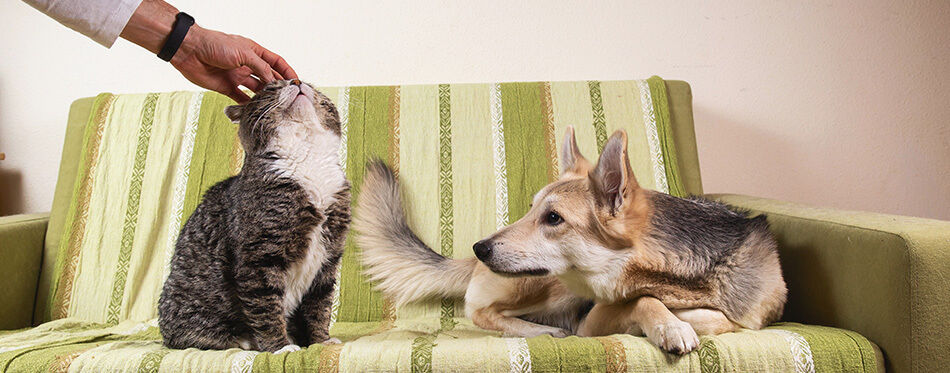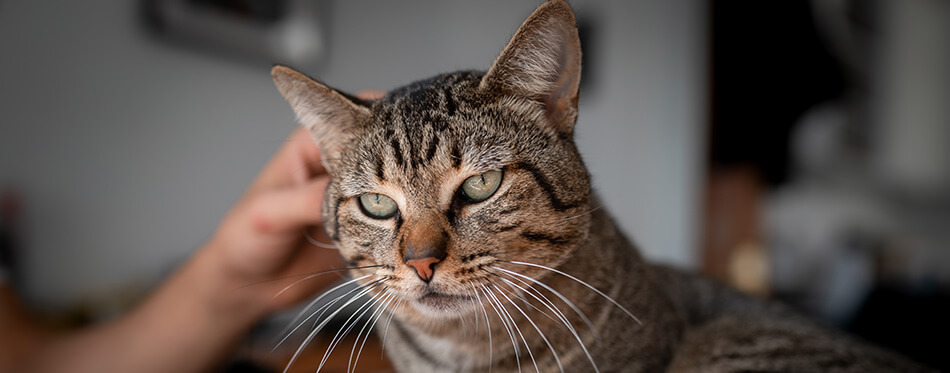Cats have different personalities, just like humans do. But as humans, it’s difficult to understand cat behavior – unless you’re trained in it or you’ve completed extensive research. As a cat owner, it’s good to know the basics of your cat’s body language, and you don’t need to be a cat behaviorist to do so!
Understand Your Cat’s Point of View
Think of a domestic cat as a tiny human. They have their own way of looking at and reacting to the world around them, but they’ve evolved to grab the attention of their owners when something is wrong. Cats believe that we’re just strange, bigger cats that have easy access to food and know how to make them feel relaxed.
Like human beings, cats can get envious. It’s the way that they display those emotions that confuses people because human emotions are displayed through facial expressions, body language, and verbal responses.
Cats don’t look like humans, so the average family member won’t know what they want until they’ve learned about their own cat’s jealous-like behaviors. Cats are often seen as creatures that exhibit aggressive behavior, but many cats in the world don’t use their claws to get their owner’s attention. Your cat will have learned, over time, that aggression is the quickest way for you to understand that they’re talking to you.

Why Do Cats Get Jealous?
Cats get jealous of other animals and other humans because they see you paying more attention to those other beings than you’re paying to them. Though this is the most common reason for your cat’s jealousy, it’s only one explanation of many. Cats are as complex as humans are when it comes to their own emotions.
Sudden changes in your cat’s environment or routine can also upset them and cause them to fly into a jealous rage or two. This pushy behavior will occur because your cat doesn’t understand why their routine has changed and they’re upset about it, but don’t know how to express those same feelings to you.
Too little personal space is a huge problem for cats, too. In a multi-cat household, you can expect to see your cats acting out quite often. Personal space is as important to cats as it is to any other pets that you have. Having two male cats in the same room during mating seasons can be a disaster if they haven’t been neutered, and that disaster will be worse if there’s a female cat nearby. One cat can be hard enough to handle, you need to be prepared to curb the envious acts of your cats when they’re young, give them plenty of personal space, and be sure to neuter all of your cats to avoid aggressive and jealous behaviors.
Socialize Your Kittens
We just mentioned keeping jealous behavior in check when cats are young. This should be a part of any socialization training that you put your kittens through during their first few months of life. Socializing a cat early will prevent them from being an aggressive cat later on in life.
In a household with multiple cats, alpha cat behavior will be shown often. Cats with poor socialization are more likely to get into or start fights, be found in strange places because they’re trying to avoid new things in their environment, and feel threatened for seemingly no reason. Cats like this feel territorial about their space, and they will make their cat jealousy very apparent.
How to Spot a Jealous Cat
While your cat is going about their regular routine, we want you to start paying attention to all of the little things they do that you may have written off as standard fussy cat behavior. Common jealous traits in cats can be seen when they hiss, growl, or swat at things with their paws. Think about the last time you sat tapping away at your cell phone and your cat was in the room with you. Did they come up and start butting their head up against your cell phone, pushing it away until you pet them? That’s an example of jealous behavior. Your cat was upset because you didn’t pet them immediately, so they took it into their own paws to make you give them attention.
A similar thing may happen if one of your pets is lying next to you on your bed and another comes into the room. Even if the pet lying with you is sleeping, the one that just arrived may growl or hiss, wake them up, and possibly swat at them to get them to move. This isn’t because your cat doesn’t like the other pet (though that can be a factor in the situation), it is because they want your attention and they feel like that other pet has your attention, instead.
Other signs of jealousy:
- Trying to sit in your lap when you’re cuddling or sitting with another person.
- Climbing over you when you’re on your computer or phone.
- Chewing or scratching belongings that you use a lot (like a video game controller).
- Scratching or biting you when you’re spending time playing together.
- Shredding furniture, carpets, and/or curtains.
- Jumping up onto countertops and shelves.
- Knocking off household items from high places.
- Using the floor as a litter box.
Though all of these behavioral issues can be attributed to jealousy, they can also be the result of other issues. For example, cats will not use a dirty litter box. If your cat is going outside of the litter box when the box is clean, it’s because they want your attention. If the household litter boxes are dirty, it’s purely because of that.
Things Your Cat Gets Jealous Of
Your cat can get jealous of any thing, person, or other animals in your life. If their cute little cat brains think that you’re paying more attention to something or someone that isn’t them, they will quickly throw a fit about it. Here are a few things you might see your cat get jealous of:
- Your dog or any dog you pet within their line of sight.
- Other animals on your property, or any that visit often.
- A visiting house guest.
- Objects in your dining room (if you happen to be using them at the same time your cat decides they want your attention).
- A new family member (including a new pet or a new baby).
- A new cat or new kitten in the household.
- Your computer or phone.
- A toy another cat is currently playing with.
- Anything you have in your hands.
It can be extremely tedious to deal with every day, which is why it’s so important to stop jealous behavior as quickly as possible.
How To Stop Jealous Behavior
Give your cats plenty of personal space – both horizontal and verticle. The best way to do this is to avoid closing doors where possible and have at least one cat tree of a decent height. Ideally, the more cats you have, the more cat trees or other verticle space solutions you should have in your home. Cats feel jealousy fast, and they don’t like it when they can’t have something another cat has. Break up the fight before it begins by giving each of your cats enough open space to roam in.
For indoor cats, it’s crucial that they have space to play, run, and explore. A dedicated cat room can work wonders, but you should also consider building a catio (cat patio). These can be fairly inexpensive to build yourself, or you can purchase pre-made catios from a reputable retailer online.
If your cat has plenty of space and they aren’t competing with others, try to figure out what else could be making them act out to get your attention. Determining why your cat has suddenly become aggressive or jealous is a huge step to curbing that behavior.
Next, we advise that you spend more time with your cat. In multi-cat households, this can feel difficult, but setting aside just 10 minutes for each of your cats surely isn’t that hard? Buy some interactive cat toys that you can wiggle for your pet, purposefully find your cat and get their attention, give them lots of pets and reward them for good behavior.
If you do have a busy lifestyle and find yourself out of the house for long periods of time, it could be great to purchase an automatic cat toy that will keep turning itself on and off throughout the day. This will keep your cat entertained, and hopefully, stop them from tearing up your furnishings.
Remember: Never reward aggressive behavior with treats or praise. You’ll reinforce that negative behavior, which will then confuse your cat when they get scolded for it later on.

FAQs:
Q: Do cats get jealous of other cats?
A: Gets will get jealous of other cats when they haven’t been socialized to be around other felines. Socializing an older cat is possible, but will take more time than socializing a kitten. Think of socialization as introducing two people who have never met; the more time they spend together, the less awkward it gets.
Q: Do cats get jealous of dogs?
A: Like socializing one cat to another, cats also need to be slowly introduced to dogs that are in your household. This will help prevent them from feeling like your dog is getting more of your attention. It wouldn’t be strange to see a cat more jealous of a dog than another cat because dogs do get more one-on-one time with their owners than cats do.
Q: Do cats get jealous of other people getting attention?
A: Unfortunately, cats will get jealous of anyone that is getting attention when they want attention. In the event that your cat is trying to get in-between you and your significant other or you and your house guest, just stop for a moment and consider what they want. Some cats just want extra pets, others are asking for food.
Q: Do my cats need separate food bowls?
A: In a house with more than one cat, having separate food dishes are a must. When it’s feeding time, cats don’t care about who they’re butting out of the way, and a more dominant cat may begin showing off their aggressive side. Keep everyone happy by having one food bowl per cat, even if they don’t stick to the same one throughout the meal.
Q: How many litter trays should my home have?
A: A minimum of two litter trays, even in a house with a single cat. Try to have an emergency tray somewhere on the upper floor of your home, if possible. You never know when your cat needs to go or if they’ve eaten something that could have upset their stomach. Better to be safe than sorry!

